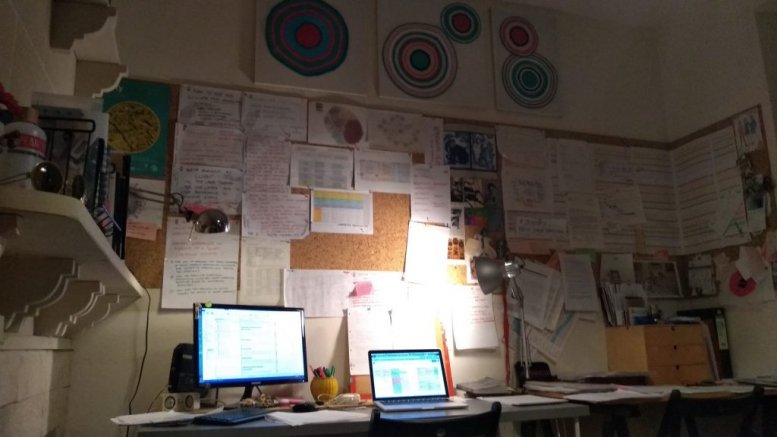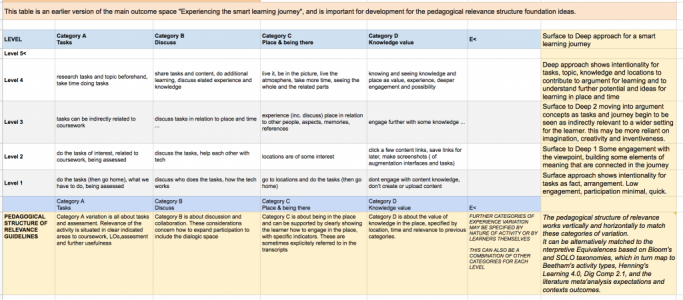Progress towards completing

This is a difficult stage, everyone says so. I’m deep into chapter five, where I outline in detailed terms how I went about analysis of data. In phenomenography this is a crucial aspect of the reliability of the findings. We don’t pursue ideas about replicability, because it’s impossible to replicate individual experience. What we do is to build communicability of our interpretive awareness – that is, we demonstrate that other researchers can validate our approach as ‘a way of doing things’, and that we can successfully communicate what we did.
Communicating my analysis process
So, my chapter five is the detail of what I did to interpret my participant interviews, to understand their structure of awareness – the close detail and the outer edge awareness of their experience – while taking part in a smart learning journey. It’s very interesting and even though for a long time I was completely in the dark about how to achieve this, and consequently a bit stressed, in the end I did have real moments of clarity to make the breakthroughs required. I now have a lot of the findings to build a ‘pedagogy for smart learning’, the desired new knowledge of the work. I am calling this a ‘Pedagogy of Experience Complexity’, and building ideas about pedagogical approach in relation to the categories and levels of experience variation, as discovered by my approach and interpretation. This achieves what I did set out to achieve, a pragmatic and very flexible approach to pedagogical support for activity ‘design’. I’m really very happy about that, as I didn’t ‘fix it’. This stuff just emerged really as a consequence of a lot of reading and thinking about the data, and the theory of phenomenography, as well as studying other people’s research practice in this field.
Table for early pedagogy of experience complexity
The writing up of this process plus the ‘second review’ checking of it by another researcher continues to be quite challenging, yet I am encouraged especially by the fact that my second researcher checking seems to really validate my interpretive stance. My way of ‘deciding’ what counted as meaning in the participant experience, and then how to grade that meaning, and to see the variation of it between and within categories, has been hugely interesting and therefore not difficult to find motivation to pursue. I’m also confident that it did emerge, I didn’t ‘make it up’, as that would be impossible to carry across so many interview utterances, and be understood, checked and agreed with by the second researcher. Though we have had a few disagreements or re-interpretations, these serve to show that the process of checking is real, and ‘works’.
I’ve also analysed ‘learner generated content’ using this table of complexity, deriving a grading scheme that complements Bloom’s Revised and SOLO grading. It’s interesting to see how that has worked, and what can be developed from this aspect. Specifically, I have begun to think about interaction design according to learner experience complexity and the subsequent generation of learner analytics data from those interactions (also discussed in a previous post).
There is still a way to go in the writing up. But Im encouraged and reasonably at ease with how it’s panned out, overall. I still struggle with word count, trying to find a balance between required detail, and being able to be concise, as even this post probably demonstrates.
A thought on the ways we ‘do a doctorate’
A big book thesis is different to other kinds of doctorate, in my humble view, in various ways. PhD by prior output is more manageable, it is chunks of time sewn together with theme and argument, but is not perhaps so granular in real depth of digging. Taught PhD is a sort of tightly supervised version of this same approach, a chunked and segmented building of work on a theme, but perhaps a taught PhD has a more defined title and so builds narrower knowledge specialism. The Big Book (traditional) thesis is a very in depth whole, spread across years, but (probably) with much less supervision and no teaching at all. I have begun to think that PhD types should potentially have a clearer way of indicating these differences. But, that’s an argument for another day.
